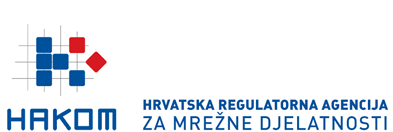ZAGREB, November 2, 2017. - The experts from the Croatian Regulatory Authority for Network Industries (HAKOM) carried out comprehensive measuring activities of interferences from neighbouring Italy causing the problems appearing on radio and TV channels. The number of complaints has been reduced in comparison with the last year primarily due to switching off of most interfering Italian transmitters from the regions Friuli Venezia Giulia, Veneto, Emilia Romagna, Marche, Abruzzo and Puglia.
Within the last three years Italy has brought the regulations and a special law according to which the TV frequency plan has been amended and the frequencies, interfering the neighbouring countries, have been excluded, the compensation fund has been founded and the switching-off procedure of distracting transmitters has been prescribed. All this resulted with switching off the interfering TV stations which began in September 2016 and ended in January this year. In addition to numerous measurements and reporting the interference, HAKOM has repeatedly and persistently emphasised the problem of interferences and resolved it through bilateral negotiations and activities within the international institutions, the ITU and the Working Groups on Cross-Border Coordination in Advisory Radio Spectrum Management Group of the European Commission.
This year, measuring activities carried out by HAKOM confirm the switching off of most interfering transmitters which has contributed to solving the major of Italian television disturbances which have been existing for the last ten years. By transition to the digital TV in Italy and launching new international non-harmonized transmitters from 2010 to 2012, the quality of DT reception was additionally disturbed along the whole coastal area and the islands. By switching off the Italian transmitters the disturbances were eliminated and the reception of television programs has improved in digital regions D5 (County of Istria and Primorje-Gorski Kotar), D7 (Zadar County and County of Šibenik-Knin), D8 (Split-Dalmatia County) and D9 (Dubrovačko- Neretva County). Unfortunately, the interfering of Italian transmitters on Croatian TV channels has not been completely eliminated which is also important for the future redesign of digital TV networks in the Republic of Croatia to enable the implementation of new mobile networks in the 700 MHz band, which will contribute to the further development of broadband internet access.
Although the improved condition on TV frequencies is visible the results of measuring activities still indicate the major problem of the Italian interference with the Croatian radio programs, especially in the summer months when due to more favourable conditions for spreading the electromagnetic waves the interferences from Italy are even more pronounced and significantly impair the ability to listen to the Croatian FM radio stations. The carried out activities from June to October resulted with 640 complaints which makes a total of more than 4500 complaints within nine- year period. The complaints have been submitted to the Italian administrations requesting their removal and at the same time HAKOM informed the International Telecommunication Union (ITU) responsible for carryng out the international agreements in the field of electronic communications.
At the last multilateral meeting in October 2017, organized under the patronage of ITU, he considered the existing situation of the Italian radio interference of neighbouring countries. The meeting looked at short-term solutions to avoid interference and a long-term solution that would permanently address the problem of interference. Based on the reported interference, the Italian side committed to draft their resolution plan and present it to ITU and neighbouring countries.
HAKOM will continue to carry out all activities in order to remove the latest disruption in the Croatian channels, and in particular, to significantly improve the situation regarding radio interferences. However, HAKOM is not able to issue direct orders to switch it off due to the fact that the transmitters are interfering in another country, outside of HAKOM’s competence.
# # #
For additional information please contact:
Croatian Regulatory Authority for Network Industries (HAKOM)
Roberta Frangeša Mihanovića 9
10110 Zagreb, Croatia
Tel. + 385 (0) 1 700 70 07
Fax + 385 (0)1 700 70 70
Media inquiries can be submitted online using HAKOM’s official website:
Registration required.
ABOUT HAKOM: HAKOM (www.hakom.hr) - Croatian Regulatory Authority for Network Industries – ensures preconditions for a fair market competition, stable growth and environment for innovations in the electronic communications and postal services market. HAKOM protects users’ interests and the possibility of choice among various communications and postal services at affordable prices, defines sustainable competitive conditions for operators and service providers under fair conditions for return on investment, and provides support to economic growth, public services and the quality of life in the Republic of Croatia by using modern technologies. HAKOM’ strategic goals are: to promote regulation of the electronic communications and postal services market, to support growth of investments and innovations in the electronic communications and postal services market, to provide efficient use of limited resources, to accelerate the growth of broadband products and services, to provide affordable offers of communications and postal services, to provide protection and informing of users, to build an efficient and comprehensive information system, to define and implement efficient processes, and to acquire multi-disciplinary competencies in market regulation.

